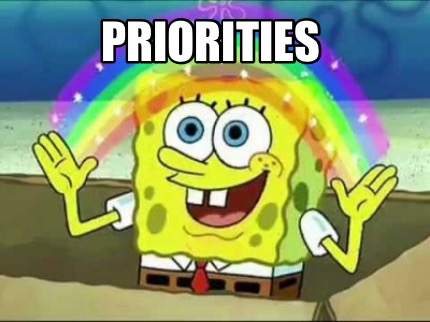How do you prioritize?
 In a previous post we found that one common thing about progressing through career stages (academic and non-academic) is that the volume and variety of tasks are going to increase from undergrad level onwards. Most of us can muddle through up to a point, perhaps by working a few extra hours, or accepting that a few things will be late or not done to the standard we’d like. But eventually there comes a point where you have too many things to do, and it’s not clear what order to do things in. Prioritizing becomes a key skill, and it’s one many of us are quite bad at.
In a previous post we found that one common thing about progressing through career stages (academic and non-academic) is that the volume and variety of tasks are going to increase from undergrad level onwards. Most of us can muddle through up to a point, perhaps by working a few extra hours, or accepting that a few things will be late or not done to the standard we’d like. But eventually there comes a point where you have too many things to do, and it’s not clear what order to do things in. Prioritizing becomes a key skill, and it’s one many of us are quite bad at.
The central issue is there’s often conflict between:
- What you need to do, i.e. what you are contracted to do, or what you need to do for your degree/thesis.
- What will improve your chances of getting the next job/promotion.
- What you want to do, or enjoy doing.
Prioritization and Productivity
There’s a lot of overlap between these two things, as techniques for one will help with the other. If you’re very productive, you don’t need to prioritize as much. If you prioritize, you’re likely to be more productive.
These two blog posts have some great advice for productivity:
- https://alifeofproductivity.com/top-lessons-learned-a-year-of-productivity
- http://www.ecoevoblog.com/2015/04/17/productivity/
It’s really important to note that productivity is not “working more”. It’s getting more done for the same amount of time and effort. A lot of this involves being kind to yourself and making sure to take breaks, eat properly, sleep, exercise, relax etc. Also there are lots of productivity tips and tools, but not all will work for you. Try some out and keep what works, ditch what doesn’t!
First steps to prioritizing
There are a few things you need to do before you can work out what to prioritize…
-
Get organised. First off you need a system for recording your tasks and deadlines, and any other non-work commitments that might influence how much time or energy you have to dedicate to something. It might take a while to set up, but once set up it should not be difficult to maintain (if it is you might need a different system). It can take a couple of tries to find a system that works for you.
-
Make a schedule. Once you have a system, schedule your unavoidable work travel, meetings, deadlines etc., but also schedule non-work stuff. This should allow you to see what time you have available to complete your tasks.
- Avoid planning too rigidly. Leave some room for flexibility. And don’t forget breaks!
- For scheduling tasks, it’s apparently better to use time slots (e.g. morning/afternoon), rather than set times.
- It’s also apparently better to schedule activities rather than goals, i.e. “work on chapter 2” rather than “finish chapter 2”, so that you feel you made progress even if you didn’t complete something.
- Make a list of back burner “procrasti-tasks” that only take up a few minutes to an hour, and don’t require much brain power (e.g. booking travel, reclaiming expenses, adding papers to your reference manager). You can do these in any spare time slots, or at times your brain isn’t working well enough to do anything more demanding.
- Remember energy levels when planning. If you’re going to a friend’s wedding on Sunday and you know you’ll be exhausted on Monday, don’t plan to do anything intense. Likewise, if you know you work better in the mornings, don’t plan difficult stuff for the afternoons.
Example system: I use Google calendars with different calendars and colours for work and non-work stuff to record meetings/deadlines etc. I use trello.com to record my tasks/objectives. If I can do something in 5 minutes or less I do it immediately, otherwise I add the task to trello and/or the meeting/deadline date/time to the calendar as soon as I get it (via email, slack, face-to-face). If this came in via email I then delete the email so I know it has been dealt with. Any emails left in my inbox still need either adding to the list or responding to. If I’m feeling overwhelmed I often also make monthly planners on scrap paper to ensure I’m not forgetting anything and to identify clear blocks of time for less urgent, but important, work.
Techniques for prioritizing
There are many techniques, and it’s worth trying a few to see what works for you.
The Eisenhower matrix
Organise your to do list into:
- Important vs not important (for you/the world)
- Urgent vs not urgent
You should end up with four categories:
- important and urgent. This will be things like finishing a presentation for conference next week, or an analysis for a paper you want to submit soon.
- important but not urgent. Things like grant writing, adding skills to your CV, learning new software/coding techniques, looking for jobs. This is the stuff that tends to get sidelined in favour of…
- not important (for your career progression) but urgent. Mostly meetings and admin.
- not important and not urgent. Do you even need to do this?
Make sure you schedule time to do the important but not urgent stuff, or you’ll spend all your time doing not important urgent tasks instead. Perhaps you can cut some non-important stuff?
The ABC Method
Organise your to do list into:
- A. Must do
- B. Should do
- C. Nice to do
Similar to the Eisenhower matrix, you should try and schedule a mixture of tasks to ensure you’re doing things you have to do, but also things you should do.
Objectives/goals versus tasks
This is more about reframing your to do list into something that helps you progress, rather than just a list of tasks to tick off. You could combine this approach with any of the other approaches.
Rewrite your to do list into objectives/goals with associated tasks. Then you focus on achieving the goals through completing tasks rather than completing tasks to achieve goals.
Prioritize based on goals not tasks.
Spur of the moment planning
Often we need to decide what to do on the spot, rather than as part of a broader plan of action. You can use these questions to plan what to do if you suddenly have a small window of opportunity to do work, but no clear plan for it.
- What can I do right now given the equipment to hand?
- How much time do I have and when do I have to do something else?
- How much energy and focus do I have?
- What has the highest payoff for me if I do it?
Eliminate tasks before they arise!
One way to avoid having to prioritize is getting better at saying no. If you say no to something then it doesn’t become an item on your to do list!
A couple of good techniques people have shared with me for saying no:
- Never say yes immediately. Always wait a bit before making a final decision. This should help you know if you really want to do it.
- Have a quota for how many things you’ll say yes to in a year. If you’re only letting yourself do five talks in a year, for example, you’ll be pickier about which ones you say yes to.
- Think carefully about time and energy costs. Energy can be as important as time. A one hour talk might not take much time, but it can kill your productivity for the rest of the day.
- Think about the “opportunity costs” of doing something - if you do X will it mean you can’t do Y? Which of those is more important to you?
- Think about benefits. What will you gain by saying yes? It’s totally OK to have “I will enjoy this” or “I will get to visit X”, or “it will be a nice thing to do” as a benefit. Just make sure that you feel that benefit outweighs any costs.
- If you say no, there are ways to make it less awkward. First do it as quickly as you can. Don’t rush, but also don’t procrastinate on a decision. Second, suggest someone else. If possible, suggest someone from a historically marginalised group who the organiser may never have thought to ask. Third, don’t feel you need to justify yourself to anyone else, just politely say no and move on, they don’t need an essay about your reasons.
- It’s fine to back out of things after saying yes if you realise it will take more time than you want to spend on it. People are very understanding. But try to do it as far in advance as possible so they can find someone else. Try to avoid getting sucked in by the sunk costs fallacy too - just because you already put in 100 hours to something doesn’t mean that spending another 100 hours on it is necessarily a sensible thing to do.
A small exception to these is if the person asking you to do things is your supervisor, boss, or head of department etc. The dynamics and expectations of such relationships mean you should have a conversation about why you want to say no. Any reasonable boss will likely be understanding, and may not realise what pressure you are currently under. It’s important that you also practice understanding with them, as they may have a good reason for asking you to do something rather than someone else. Open communication is key.
P.S. Don’t be a jerk. I am writing this assuming you, like me, find it hard to say no, and like trying to make science a nicer and kinder place. Please don’t use these tips as an excuse to act like a jerk and only do things for yourself. We should all be taking on some tasks that don’t directly benefit us so that the burden is spread evenly. Many tasks are disproportionately taken on by women and historically marginalised people - help them out by saying yes to some of these tasks too. Review papers if you’re submitting papers. Take on admin jobs. Volunteer for your professional societies. Teach. Do outreach. Just don’t feel you have to do all of it all of the time!
Finally review, reflect and revise.
It’s easy to jump into doing these sorts of things without thinking and getting stuck in a rut. It’s also easy to come up with brilliant plans, only to fall back into panic mode after a short time. Make sure to schedule in time (once a week to start with, then once a month or once a quarter) to review what you’re doing, what is working, what isn’t and why, and then to revise your plans where necessary.
Natalie
@nhcooper123
